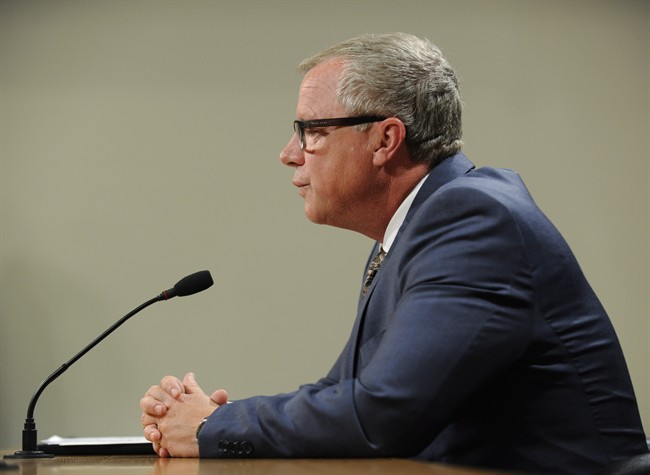Saskatchewan Premier Brad Wall says a long-awaited apology to victims of the ’60s Scoop could come before he ends his decade-long career in office.

Wall announced two years ago that an apology would be coming for decades-old policies of removing Indigenous children from their homes and placing them with non-Indigenous families — a practice that stripped the children of their language, culture and traditions.
READ MORE: Alberta Premier Rachel Notley says talks continue on ’60s Scoop apology
He said at the time that the province did not intend to offer cash to the victims.
“We are ready immediately. We are ready to do this next week,” Wall said Friday after announcing an upcoming byelection for the constituency of Saskatoon Fairview.
Manitoba became the first province to apologize to Indigenous adoptees in 2015. Wall said it’s up to the Federation of Sovereign Indigenous Nations and Metis Nation-Saskatchewan to suggest an appropriate venue for the apology.
Wall added he’s not expecting to be premier past January and would like the apology to happen before he retires.
“We want to earnestly provide this opportunity for reconciliation,” he said.
WATCH MORE: Saskatoon reaction to Premier Brad Wall stepping down as Sask. Party leader

Wall announced Thursday that he is stepping down to allow for renewal in his party and government. He said he intends to stay on as premier and MLA for Swift Current until a replacement is chosen through a leadership convention.
After announcing his retirement plans, Wall said he wished more progress had been made to improve the lives of Indigenous people during his ten years in office.
Some headway was made on education and employment, but “there has not been enough progress that I would point to with satisfaction.”
Robert Innes, an associate professor of Indigenous studies at the University of Saskatchewan, said there were a few positives during Wall’s tenure when it came to Indigenous issues, but with big caveats.
The Saskatchewan government fostered partnerships with First Nations and Metis communities on resource development, but he said that kind of economic development has a shaky foundation in the long-term.
“Once the economic opportunities dry up, what’s left of the foundation?”
READ MORE: ’60s Scoop survivors say Canada back-tracking
Innes said the province was an early supporter of an inquiry into missing and murdered Indigenous women, but recent budget cuts aimed at wrangling a $1.3-billion deficit have hurt First Nations and Metis women and children.
“Saying that you’re going to support an inquiry and then making lives more difficult for Indigenous women is very contradictory.”
Innes said he would like to see the premier and his successor take a stronger leadership role in fighting anti-Indigenous discrimination.
The issue was brought into the forefront following the shooting death of a young Cree man a year ago.
Colten Boushie was killed Aug. 10, 2016, after the vehicle he was in drove onto a farm west of Saskatoon. The property-owner, Gerald Stanley, has pleaded not guilty to second-degree murder and is to face trial early next year.
READ MORE: Colten Boushie’s family mark shooting anniversary with prayer, feast
The shooting ignited racial tension in the province prompting Wall to condemn “racist and hate-filled” comments he’d seen online.
But he said last summer that racism is not unique to Saskatchewan, nor is it somehow worse in the province as some have suggested.
Innes said he was not satisfied with that response.
“The premier has to acknowledge that there’s racism and it’s prevalent in this province.”
By Lauren Krugel in Calgary


Comments